Sports
/ArcaMax
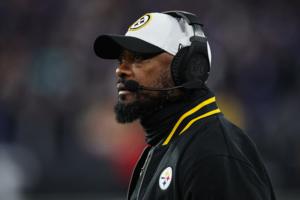
Steelers will play Vikings in Ireland on Sept. 28
PITTSBURGH — The Steelers knew they were headed to Ireland for one of their regular season "home" games. And they had a good idea of the date.
Now they know the opponent — the Minnesota Vikings, the team they faced the most recent time they played an international game in 2013.
The NFL announced Tuesday the Steelers and Vikings will play ...Read more
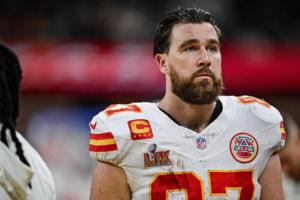
Chiefs star tight end Travis Kelce drops 25 pounds to prepare for next NFL season
Travis Kelce has had a weight loss transformation.
The three-time Super Bowl champ, also known as Taylor Swift’s boyfriend, has revealed he lost 25 pounds in preparation for what could be his final season in the NFL.
During the Amazon MGM Studios Upfront in New York City on Monday, Kelce — sporting a noticeably trimmer physique — told ...Read more
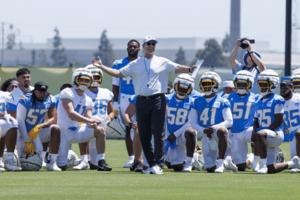
Chargers season opener will be first NFL game streamed exclusively on YouTube
LOS ANGELES — The Chargers' season opener in Sao Paulo, Brazil, will be the NFL's first game streamed exclusively on YouTube, the league announced Tuesday, further expanding the NFL's streaming footprint to include the ubiquitous free video platform.
Despite now having a home team and TV partner for the matchup, the Chargers' opponent was the...Read more

'ChiefsAholic' superfan gets state prison sentence tacked onto federal term for bank robberies
Like Patrick Mahomes marching the Kansas City Chiefs on another game-winning drive, Xavier Michael Babudar — aka the "ChiefsAholic" superfan — can put numbers on the board.
A court on Monday in Oklahoma sentenced the serial bank robber to a 32-year term in state prison that will run concurrently with his federal sentence of 17 1/2 years. ...Read more
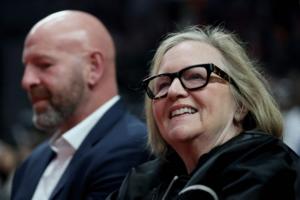
Seahawks are not for sale as owner puts Trail Blazers on the market
SEATTLE — The Portland Trail Blazers, owned since 2018 by Jody Allen after the death of her brother Paul, are for sale, the team announced in a statement Tuesday morning.
But the Seattle Seahawks, which Allen also owns, are not.
“This news does not affect the Seattle Seahawks NFL franchise or the estate’s 25% interest in the Seattle ...Read more
Rams will face the Jaguars in London this season
LOS ANGELES — The Rams will be back on the international road this fall.
The NFL announced on Tuesday that the Rams will be the visiting team against the Jacksonville Jaguars on Oct. 19 at Wembley Stadium in London. The game will kick off at 6:30 a.m. PDT and will be broadcast by NFL Network.
The full NFL schedule will be announced Wednesday...Read more
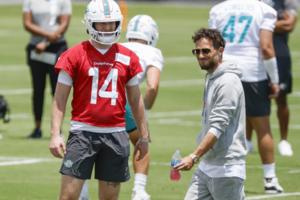
Omar Kelly: Mike McDaniel must evolve to ensure his survival
MIAMI — What people say behind your back isn’t always flattering, but should serve as a reality check.
Or at least an opportunity to check yourself, and your approach.
It’ll probably cause pain and insecurity, but that doesn’t mean we shouldn’t hear it because oftentimes self reflection is the best catalyst for change, and growth.
...Read more
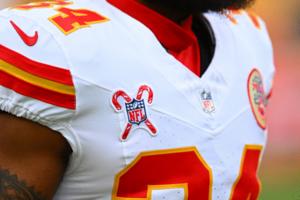
Chiefs will play Broncos on Christmas Day
KANSAS CITY, Mo. — The Kansas City Chiefs have had their hand up for Christmas Day games, and they’re being called upon once again.
The Chiefs will meet their AFC West rivals, the Denver Broncos, on Dec. 25 at home. The game will be broadcast on Prime Video, the streaming service announced.
This will mark a third straight year the Chiefs ...Read more
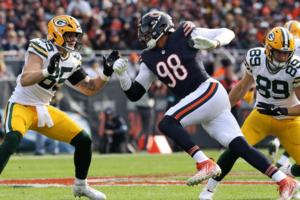
Bears will play Packers on the Saturday before Christmas -- and Eagles on Black Friday
CHICAGO — After a two-year hiatus, the Chicago Bears-Green Bay Packers rivalry is returning to prime time — and the Bears also will be playing on Black Friday.
Fox Sports announced Monday that the Bears will host the Packers at Soldier Field in Week 16 on Saturday, Dec. 20, as the NFL began a slow trickle of releasing marquee games in ...Read more

Ex-Rams star Aaron Donald granted restraining order against woman who claims she's his wife
LOS ANGELES — Retired Rams defensive lineman Aaron Donald has been granted a five-year restraining order against a woman he alleges has stalked him, threatened his son's life and claimed to be his wife.
The restraining order against Janelle Anwar was issued during a Los Angeles County Superior Court hearing Wednesday in downtown L.A. Donald ...Read more
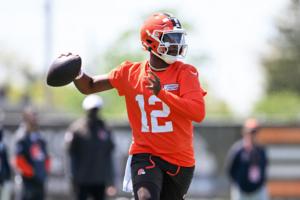
Man suing NFL over Shedeur Sanders draft drop says $100-million lawsuit is no joke
LOS ANGELES — Eric Jackson realizes a lot of people aren't taking him seriously at the moment.
But he's very serious about his $100-million lawsuit against the NFL over the "severe emotional distress and trauma" he says he suffered when former Colorado quarterback Shedeur Sanders unexpectedly dropped to the fifth round of last month's draft. ...Read more
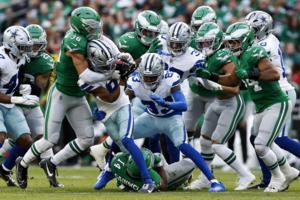
Eagles will open 2025 season at home vs. Cowboys with a Thursday night game
PHILADELPHIA — The Super Bowl champion Eagles are set to kick off the 2025 NFL season with a Thursday night matchup against the Dallas Cowboys.
The division rivals will meet at Lincoln Financial Field on Sept. 4 at 8:20 p.m. ET, marking the first season opener between the teams since 2000.
Mike Tirico made the announcement Monday morning on ...Read more
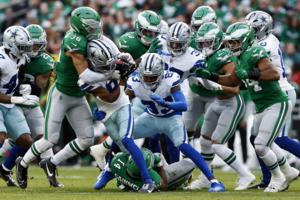
Mike Sielski: The Eagles couldn't have asked for a better opening-night opponent than the Cowboys
PHILADELPHIA — The Eagles could not have asked for a better opening-night opponent than the one they got. They’ll face the Dallas Cowboys at Lincoln Financial Field on Thursday, Sept. 4, which is enough to make you think that perhaps there was some kind of handshake deal between the NFL and the Eagles that granted them such a favorable ...Read more
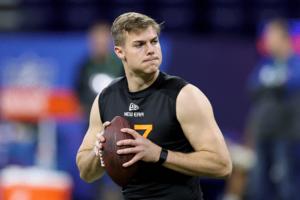
'Story of my life': Rookie QB Will Howard is just fine joining Steelers while under the radar
PITTSBURGH — Will Howard is used to being the underdog. It's become part of his identity.
Tell him he's not good enough, and he'll make it his life's mission to prove you wrong. The Steelers' rookie quarterback has done that every step of the way during his football career.
At Downingtown West High School in Chester County, Pa., Howard was ...Read more
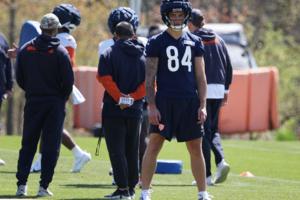
Brad Biggs: With Colston Loveland focusing on mental reps, it's easy to dream big about the Bears rookie TE
CHICAGO — A high bar has been set the last two years with Sam LaPorta making a run at Mike Ditka’s record for receiving yards by a rookie tight end in 2023 and Brock Bowers eclipsing it last season with the Las Vegas Raiders.
LaPorta blossomed instantly as a major cog in the Detroit Lions passing game under offensive coordinator Ben Johnson...Read more
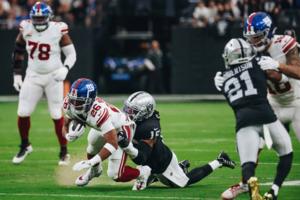
Raiders bring back veteran linebacker after minicamp tryout
LAS VEGAS — The Raiders are signing veteran linebacker Jaylon Smith, who has not played in the NFL since 2023.
The former Notre Dame standout was once one of the most productive linebackers in the league. He had 121 or more tackles in three straight seasons for the Dallas Cowboys from 2018 to 2020. Injuries have marred his career, however. ...Read more
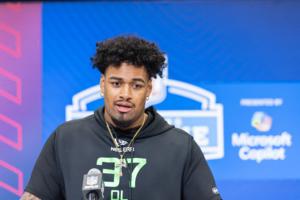
Sam McDowell: Josh Simmons 'surprised' the Chiefs in first practice. Why next step is critical.
KANSAS CITY, Mo. — The Chiefs brought their draft picks, free-agent rookies and tryout hopefuls to Kansas City last weekend, nearly 90 of them in all.
This column is about the future of just one — because it’s the player on which the success of the Chiefs’ 2025 draft class should pivot.
Josh Simmons.
If the Chiefs have found a ...Read more

Paul Zeise: Steelers are in the same bad position at wide receiver they were in last year
PITTSBURGH — I listened with intent and learned from Omar Khan this past week when he met with the media and talked about the wide receiver position.
Khan’s contention is the Steelers are in a much better spot than they were last year, even though they only have one legitimate top receiving option on the roster. I am willing to concede ...Read more
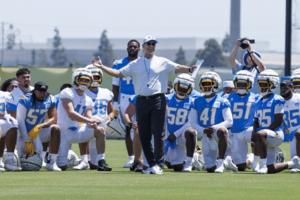
Jim Harbaugh taking a new approach to evaluating Chargers' rookie talent
LOS ANGELES — Before the Chargers put diamonds in any Super Bowl rings, Jim Harbaugh is looking for diamonds on the practice field.
"Rare gems, they don't just hop out of the ground and into your pocket," the Chargers coach said as the team began rookie minicamp Friday. "You gotta dig."
The Chargers are searching for their hidden gems ...Read more
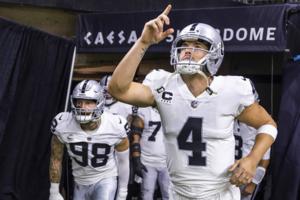
Saints QB Derek Carr announces retirement in stunning statement
LAS VEGAS — Derek Carr, who rewrote the Raiders’ record book during his nine seasons with the club, is retiring from football after suffering a serious shoulder injury last season with the Saints.
Carr, 34, spent the past two seasons with New Orleans after being released by the Raiders following the 2022 season. The lingering effects of the...Read more
Popular Stories
- Chiefs star tight end Travis Kelce drops 25 pounds to prepare for next NFL season
- Steelers will play Vikings in Ireland on Sept. 28
- Raiders bring back veteran linebacker after minicamp tryout
- Sam McDowell: Josh Simmons 'surprised' the Chiefs in first practice. Why next step is critical.
- Paul Zeise: Steelers are in the same bad position at wide receiver they were in last year





